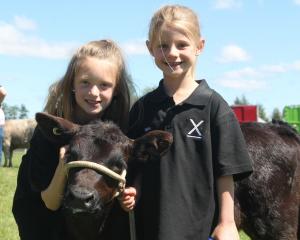
For that was when the North Otago Irrigation Company (NOIC) environmental manager saw waterways fenced off, riparian plantings, farms in "tip-top condition" with green grass and healthy animals. And that was satisfying to see.
The NOIC scheme, officially opened in October 2006, is a piped and pumped scheme which delivers water to thousands of hectares across the district’s downlands.
The scheme officially shut down for the winter months earlier this month but the work at the company’s head office in Oamaru continued.
The regulatory environment had intensified, with regard to environmental compliance on-farm, and the company now had two staff working in that area — Mr Searle and environmental adviser Anita Walton who started in February.
Chief executive Andrew Rodwell said the company’s commitment to ensuring environmental compliance and best practice had manifested by its investment in people.
NOIC also provided environmental services for both the Kurow-Duntroon and Maerewhenua schemes.
Mr Searle said the key part of the environmental team’s role was to ensure the resource consents the company had to take water for irrigation use were maintained. Put simply, without consent, shareholders would not have access to irrigation water on-farm.
The consents had various conditions and good management practices were part of that. "We’ve got to make sure our shareholders comply with conditions, otherwise consents are at risk," Mr Searle said.
As part of that, shareholders were required to have a farm environment plan which set out what they needed to do on-farm to ensure consent conditions were met, including irrigation, effluent and nutrient management, and stock exclusion from waterways.
NOIC’s job was to ensure farmers had an up-to-date farm environment plan, he said; an independent auditor audited each farm.
Those receiving an A-audit were audited every three years, B was two and C was one. This season, only one NOIC farmer received a C.
The Bs were "not because they are doing naughty things on farm", mostly it was because they had not got the documentation required as they were "busy beavering away" on the farm, and not recording things, Mr Searle said.
The audit list was being prepared for next irrigation season and the farm environment plan template was being tweaked.
Mr Rodwell said the company endeavoured to support farmers, understand why some might have issues and "support them to do the right thing".
That included working with catchment groups, such as North Otago Sustainable Land Management (NOSLaM) — which it contributed funding to — to help identify if there were issues around water quality.
NOSLaM extended past the NOIC catchment of farmers and being involved with the Kurow-Duntroon and Maerewhenua schemes was also in its interests, as it wanted ‘the whole of Waitaki" to perform at the highest possible level from an environmental perspective, Mr Rodwell said.
In time, NOIC would apply to Environment Canterbury for renewal of those consents to take water and so the reputation of the area was very important.
In a theoretical situation, if NOIC was not attentive and did not invest in capable people, there would potentially be degrading farms and it would ultimately run out of any resource consents.
Irrigated farming would be compromised which would have a massive impact on the district. So it was about maintaining a high standard of performance from both parties.
NOIC’s job was not to argue with the Government about rules, it was to implement them, and maintain the perception of the farming community as one which operated to high levels of standards. There was also the brand aspect, he said.
Mrs Walton said the regulatory space was "moving goal posts" and results from 2017 could not be compared to now. The goal posts changed as regulations from central and local Government changed.
She and Mr Searle, who were both farmers, had an affinity for and understanding of those they were working with.
"It’s our asset, our livelihood, our future. No-one wants to purposely degrade it," she said. Farmers had generally embraced change, Mr Searle added.
Mr Rodwell said demand for water this past season had been low, because of the climatic conditions, and reliability of supply had been very high.
He praised the field operations team which were on-call seven days a week, 24 hours a day to respond to any issues with the scheme.
A $1million investment in a second transformer at Black Point, near Duntroon, took away one of the major risks for the company if the sole transformer had failed.
A major project at the moment was around its asset management system, to institutionalise all of the knowledge which existed among those involved with the scheme to ensure it was retained beyond the tenure of people.
The ability to plan and predict maintenance projects and costs was critical when there was complex infrastructure being used which is the case with NOIC.
By feeding data into the system, performance could be tracked over time, ultimately saving money and preventing disastrous events occurring because the company was not aware an asset was beginning to deteriorate, he said.














